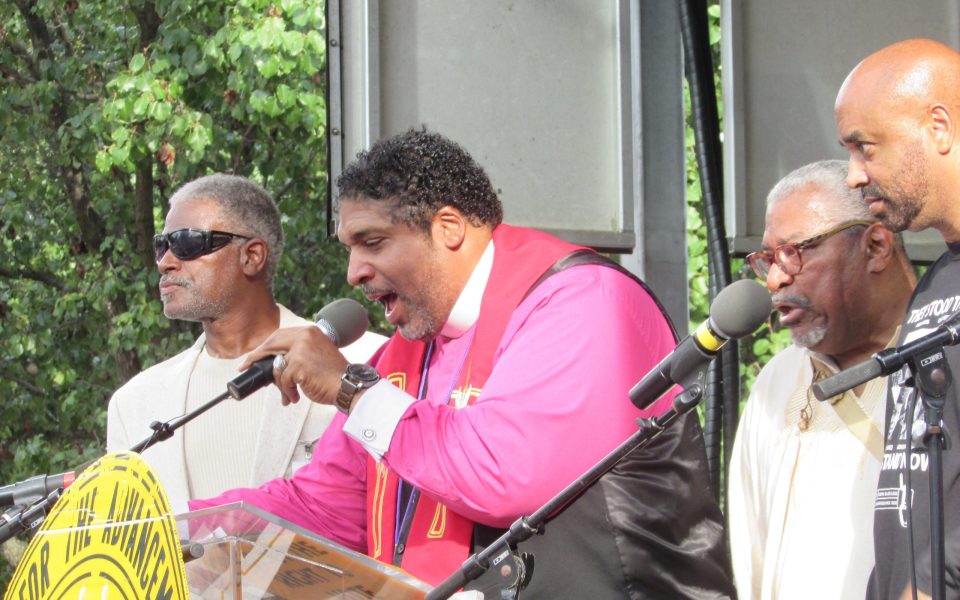by Jordan Green
History was on the minds of the civil rights leaders and lawyers in Winston-Salem on Monday.
Speaking before thousands of supporters from across the state at Corpening Plaza, the Rev. William J. Barber II, president of the North Carolina NAACP, updated the apostle Paul’s message to the early Christians.
“Some were whipped, some were murdered,” he preached. “Some were cut in two. Some were lynched. But they kept on pressing. Paul said something else: ‘They have suffered unto blood as you who are living have not yet suffered unto blood.’”
Barber noted that in 1965, the same year Alabama state troopers bloodily repressed a civil rights march from Selma to Montgomery, the Ku Klux Klan dynamited the cars of North Carolina civil rights lawyer Julius L. Chambers and Jones County NAACP Director Carolina B. Chadwick while they were meeting at a church in New Bern.
“We need to remember that these rights were won by blood,” Barber said. “Blood yesterday, and blood today.” Then, invoking the assassinations of the Rev. Martin Luther King Jr. and Malcolm X, along with the massacre of nine parishioners in Charleston, SC last month, Barber asked, “How dare someone try to desecrate the blood of our martyrs?”
As Barber and other leaders of the contemporary movement often note, the atrocities of Selma and the murder of numerous civil rights workers led directly to the signing of the Voting Rights Act of 1965 by President Lyndon Johnson.
They also point out that the US Supreme Court’s Shelby County v. Holder decision in June 2013 was followed in a matter of days by a dramatic expansion of the omnibus election reform bill that had been filed in the NC General Assembly, which would soon became law with the swipe of Gov. Pat McCrory’s pen.
The Mass Moral Monday gathering in Winston-Salem, scheduled to coincide with the first day of the federal trial to challenge the new election law, culminated a week of mass-mobilization activities by the Forward Together coalition led by the North Carolina NAACP.
Democratic members of Winston-Salem City Council, including Mayor Pro Tem Vivian Burke and members Denise D. Adams, Derwin Montgomery, James Taylor, Dan Besse, Molly Leight and Jeff MacIntosh, hosted community forums on voting rights in their respective wards over the course of the preceding week. On Sunday, as caravans of activists arrived in Winston-Salem from across the state, Union Baptist Church hosted an ecumenical service. And on Monday, while the federal trial was underway, the state NAACP facilitated teach-ins on racial profiling and mass incarceration, living-wage struggles and coalition building, along with voting rights.
The historical weight of the mass gathering at Corpening Plaza on Monday evening was underscored by the presence of the Rev. Jeremiah Wright, the former pastor to Obama, and greetings via letter from David Goodman, the brother of one of three civil rights workers murdered by white supremacists in Neshoba County, Miss. in 1964.
But some of the most fervent cheers were reserved for Penda Hair, the lead attorney for the plaintiffs with the Washington, DC-based Advancement Project. Hair told the crowd that, among other things, the plaintiffs are seeking a judicial order under a little-known provision of the Voting Rights Act to impose federal preclearance on future election-law changes in North Carolina. Prior to the Supreme Court’s Shelby ruling, she said, the provision had little relevance.
“The NAACP and other plaintiffs understand that this is a pivotal moment in North Carolina and US history,” Hair said. “What happens in this courtroom this week will have a decisive impact on African Americans and Latinos, and on the Voting Rights Act. This is our Selma!”
Join the First Amendment Society, a membership that goes directly to funding TCB‘s newsroom.
We believe that reporting can save the world.
The TCB First Amendment Society recognizes the vital role of a free, unfettered press with a bundling of local experiences designed to build community, and unique engagements with our newsroom that will help you understand, and shape, local journalism’s critical role in uplifting the people in our cities.
All revenue goes directly into the newsroom as reporters’ salaries and freelance commissions.


Leave a Reply